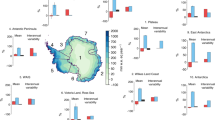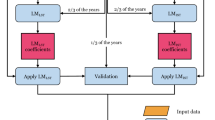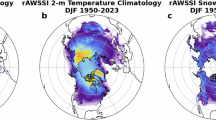Abstract
IT is well known that on the Antarctic lands perpetual snow descends much lower than in corresponding latitudes of the northern hemisphere. The chief cause of this is, no doubt, the difference of climate due to the preponderance of land in the northern hemisphere and of water in the southern. But there is another cause, of sensible magnitude, which I have not seen mentioned. In high southern latitudes the barometer stands permanently nearly an inch lower than in corresponding northern latitudes, and this must cause a permanently lower temperature in the Antarctic regions. That is to say, a depression of an inch in the barometer corresponds to about 1000 feet of mountain ascent; and any station in the Antarctic region must therefore be as much colder than a corresponding one in the Arctic region, as if the Antarctic station stood 1000 feet higher above the sea-level than the Arctic one.
This is a preview of subscription content, access via your institution
Access options
Subscribe to this journal
Receive 51 print issues and online access
$199.00 per year
only $3.90 per issue
Buy this article
- Purchase on SpringerLink
- Instant access to full article PDF
Prices may be subject to local taxes which are calculated during checkout
Similar content being viewed by others
Author information
Authors and Affiliations
Rights and permissions
About this article
Cite this article
MURPHY, J. Meteorology of the Antarctic Region. Nature 26, 366 (1882). https://doi.org/10.1038/026366d0
Issue date:
DOI: https://doi.org/10.1038/026366d0



